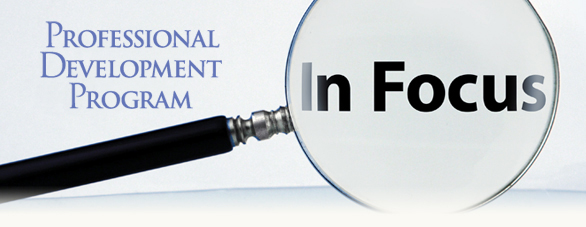Videoconference training: Guidance and Discipline for Infants and Toddlers
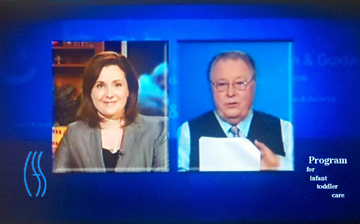
PDP recently partnered with the NYS Office of Children and Family Services, WestEd's Center for Children and Family Studies, and the Early Care and Learning Council to present the November 10, 2011 videoconference training titled Guidance and Discipline for Infants and Toddlers.
The presenter for the videoconference was national expert on early childhood development and Co-Director of WestEd's Center for Child and Family Services, Dr. J. Ronald Lally. Dr. Lally has directed the child and family related programs at WestEd, a research and development agency in Sacramento, CA, since 1978, and has directed the work of the Program for Infant/Toddler Care (PITC) since 1985.
During the videoconference, live, via satellite from California, Dr. Lally provided New York child care providers with a unique learning experience based on the latest research and practice in the field of infant and toddler care and his extensive experience as a national leader in this field.
In addition, PITC trainers supplied by the Early Care and Learning Council facilitated two on-site activities at the different videoconference sites throughout the state. These trainers used specific skills and methods developed by WestEd to lead the trainees through activities developed by WestEd and Dr. Lally.

As a way to help illustrate some of Dr. Lally's teaching points, the PDP Media Department interviewed PDP staff Chad Steiner, Lakia Green, Jill Finnegan, Kathryn Connell, Gary Glinski, Everton McLean and Jennifer Kang about their parents' style, or Metatheory, of childrearing. The edited video served as a vital part of the videoconference training broadcast helping segue between Dr. Lally's content and the activity session participants did with the PITC trainers at their sites.
To view that portion of the videoconference broadcast, click on the following link:
http://easylink.playstream.com/DLP/ron lally/Metatheories.wvx
The responses from participants and site co-trainers about using this different approach to videoconference delivery have been encouraging. Many trainees indicated a high satisfaction rate and their intentions to incorporate knowledge they gained during the training into their child care programs.
Some comments received include:
- Having a national specialist was well received
- Dr. Lally presented directly from questions and used the resources that the participants were provided-WONDERFUL!
- Entire training was great
- Participants really enjoyed this training and I believe took a lot away from this training
- This was a wonderful class!! I really enjoyed it, all the teachers were GREAT!!
- Ways to implement in daily life in classroom. Best training yet!
- Learned new techniques to help with the behaviors of infants and toddlers
This was a really good training class, a lot of different things to think about and put into motion in our program
How Do You Solve the Training Problem for Experienced Workers?
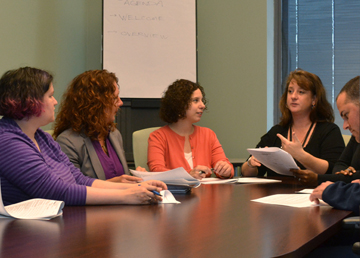
Professional development for experienced workers has been a challenge for many organizations. Experienced workers have the basic knowledge and an accumulation of varied experience, yet need the time to identify and often learn from each other what specific information, skill and strategies actually work with their clientele and colleagues.
A new approach for these experienced workers is being rolled out by PDP this fall. Via a collaborative effort with OCFS, PDP is piloting several learner-centered seminars for child day care regulatory staff; both licensors and registrars, intended to address site specific training needs by building a community of learners in individual organizations.
These seminars are fundamentally participant driven. The professional facilitator works with a site contact person (usually a supervisor or manager) to develop an initial agenda, based on feedback from Needs Assessments, Evaluations and less formal staff discussions. The first seminar session takes time for participants to develop measurable objectives used to help focus the group's discussion, research and sharing of strategies and individual goals. Customized handouts, references and resources are researched, developed if necessary, and printed to correspond to each of the session's area of focus. Participants are encouraged to take on as much of these efforts as they can. This promotes independent learning and more collegial accountability among members of the group. There is also "on the job homework" developed and assigned to encourage and support participants to apply their knowledge and skill during the regular work schedule following each session.

Each seminar has multiple sessions. Each session is 2-3 hours. Sessions are scheduled approximately one month apart to allow for application of knowledge and skill in between sessions. Each session includes participant feedback and discussion on individual levels of skills implementation success.
Seminars (learning communities) have been in existence for many years. PDP is anxious to see what the overall results of this new approach are for the child day care regulators and, ultimately, for their improved services to children, families and child day care providers. The first two seminars concluded, with a sample of comments from participants:
- "I LOVE the seminar format!!"
- "The interaction of different counties and registrar personnel made it more interesting."
- "Sample activities, conversations. Best thing [was] before and after letters to achieve a goal." "Listening to other people with their issues because it helps to see how others view things or they may have a solution to that problem."
- "I felt ownership toward the seminar."
- "The book is great. The format was beneficial and allowed our input. It would be nice to address other topics in this format."
- "Trainer sitting at table with us at eye level brought a different format to the table. Also the small class size was helpful."
Using Synergy to Develop e-Learning
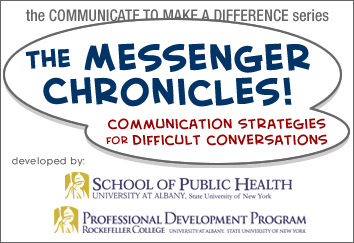
"One of the most interesting discoveries I have made since joining the Instructional Technologies Group," says PDP's Maggie Cusack-Steciuk, "has been the concept of team synergy." The importance of cooperative action and working together is the basis for the last module of The Messenger Chronicles, the series of online courses PDP has developed for the New York New Jersey Public Health Training Center (NYNJ-PHTC).
"Each of us is a Messenger," explains Maggie, "and we can choose our own communication delivery method based on the desired results. Building on the many positive approaches to interaction already presented in the Chronicles, synergy and the effect of synergy is a capstone concept. Synergy is the concept that the whole is greater than the sum of its parts. The relationship that the parts have to each other is also a part in and of itself: a catalytic, empowering, unifying, and exciting part."
A major advantage a team has over an individual person is its diversity of resources, knowledge, and ideas. This diversity, however, can be the basis of conflict, rigidity, and barriers—preventing the possibility of team synergy to form and develop. "This new training," says co-developer Ed Skawinski, "supports the use of assertive inquiry to help the learner gain an understanding of others' perspectives. When learners have the tools to gain an understanding of other people's perspectives, a synergistic team can develop—a team which is greater than the sum of its parts."
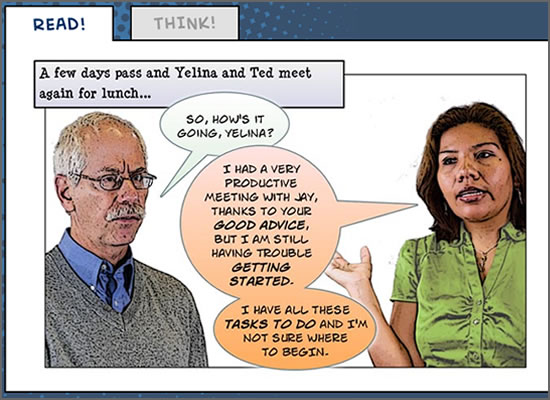
Working at PDP for just a short time, Maggie says she appreciates the opportunity to be a part of what is happening in Instructional Technologies—to use team synergy in developing e-learning for the public sector. "From the outside workshops I've attended," reflects Dr. Cusack-Steciuk, "this group at PDP is at the forefront of the thinking in the use of social media and games in education. As time goes on, my respect for the team members grows, and I am a witness to small miracles in synergy every day."
PDP has partnered with the UAlbany School of Public Health to create these online courses, which are free and open to an international audience, which targets the public health sector. The Messenger Chronicles include:
- Managing Stress and Time (example screen shown here)
- Dealing With Difficult Conversations
- Flex-time Fiasco
- Be Prepared!
- Moving Towards Synergy


